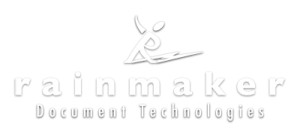This week was the monthly Capital Area Paralegal Association meeting and I had the pleasure of hearing John Heining from the Texas Legislative Council speak on “An Overview of the Law and Ethics of Blogging.” As the Rainmaker Document Technologies resident blogger, I was very interested to hear what he had to say about the topic and any potential issues that could arise regarding my blog posts. It was a very interesting presentation with humorous real life examples of what could and has gone wrong for others.
Before I go into the take-away’s from the lunch, lets first take a quick look at why people blog in the first place. Blogs are a great way to share information with friends and family about your personal life. They allow you to express feelings and opinions, share funny stories and even pictures. Blogs like this one are also used as a business tool. Google loves fresh, new content so to assist with SEO (Search Engine Optimization) businesses create new information on their website using blog posts. The trouble arises when people, business and public figures start sharing personal opinions that could be considered controversial.
While most of the information in John’s presentation pertained towards those actually in government or practicing law, there were some key points that I found very interesting:
- While you may be posting your articles from your desk in Texas, blogs and websites can be read all over the world and are therefore also subject to the laws of other states and countries. For example, in the US it might be ok to say something defaming about a celebrity as long as it is true, but, in England, newspapers and tabloids can get in trouble for printing even true negative statements. Just ask Madonna about this one.
- Just because something is deleted from the web doesn’t mean it is really gone. Websites such as Google and Archive.org use a “wayback” machine that takes pictures of websites at certain points in time. Deleting something may help you get in less trouble, but it doesn’t make it go away or change the fact that you posted it.
- Disclaimers never hurt. You know that language you see at the bottom of your tax accountant’s email? The one that says “Any tax advice contained in the body of this material was not intended or written to be used, and cannot be used…blah blah blah.” Well, that is so they are covered. Links, referrals and endorsements should be handled with care especially if you are in a business partnership with someone and they are profiting from your referrals. For example, if you are and attorney with a specialization and you refer a client you can not personally assist to someone that pays you for referrals, you need to make that relationship known.
- What you say can and will be held against you. Be careful what you say about the company you work for, your boss or any controversial topic. What you say is permanent and although it may sound like a good idea at the time, you never know how it could affect your future. Potential employers have started searching blogs and social media sites from information about applicants and its better to be safe than sorry.
The moral of the story is this – blogs are not anonymous so it’s best to stay away from upsetting things that could get you in trouble. Everything is permanent so think about the effects of your opinion on your future. Oh, and expect a disclaimer post on this blog in the very near future…….


